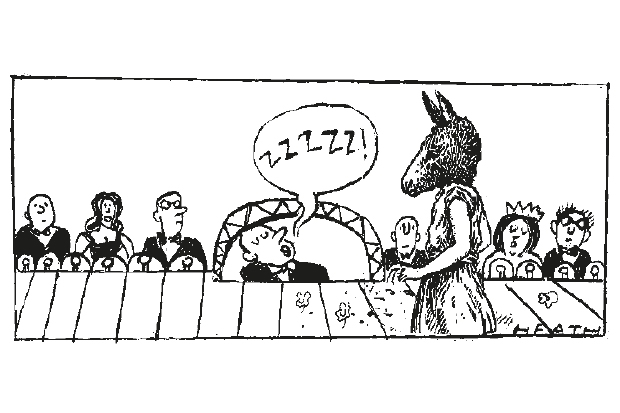I love Shakespeare. But when he pulls on his wellies and hikes into the forest I yearn for the exit. A Midsummer Night’s Dream has a moonlit, sylvan location populated by a syrupy crew of hectic fairies, humourless bumpkins, panting maidens and swooning aristocrats in disguise. Shakespeare wrote it during his apprenticeship and he had yet to learn that several romances are far less interesting than just one. The result is a cloying, over-busy fantasy whose highlight is a love potion that makes a sprite called Titania fall in love with a donkey called Bottom. If you find the passion that flowers between a Sloane-y dryad and a pack animal hilarious then poor you. Actors like performing ‘the Dream’ because of the ‘rude mechanicals’ (amateurs trying to act), who offer them a chance to forsake discipline and ham it up like crazy. Panto has similar attractions. And I’m always puzzled to know how much of the Dream is make-believe? Most of it? Or more likely all of it? Even a six-year-old is solemnly warned against ending a story with ‘and then I woke up’. This dud puts Shakespeare at the back of the class.
As You Like It, set in the Forest of Arden, repeats the fault of over-complexity and introduces us to a national park full of panting maidens and lovelorn swains. Jacques’ ‘All the world’s a stage’ soliloquy is of course timeless. But is it worth enduring three hours of ferny frolics just to hear a speech that familiarity has already staled?
And there’s Illyria. In Twelfth Night the comedy comes from romantic characters choosing to go out in the wrong clothes. Few plays can make cross-dressing work properly because the characters never seem to be responding authentically to what is in front of their eyes. Falling in love implies a level of emotional intensity, and a degree of physical scrutiny, that doesn’t fit with flimsy disguises nabbed from a dressing-up box. It’s true that the scenes with Malvolio can be pretty funny. They can also be staggeringly unfunny. I wouldn’t weep if I never saw this play again. I’d cheer.
And there’s The Winter’s Tale. This play haunts me. I once acted in it (badly). I studied it for A-level (Grade D). I’ve suffered and wept and prayed in the stalls as its cheerless scenes of cruel melodrama and contrived hilarity crawled towards the curtain-fall. The first half feebly retraces the plot of Othello without any psychological development. It just happens. Bang! Leontes goes nuts with jealousy. His wife Hermione is imprisoned, their daughter is exiled, their son dies. Then bang! Leontes made a mistake. Whoops. Then the interval. Sixteen years pass (although it usually feels like longer). The second half takes us to a Bohemian timber-grove that teems with garrulous thieves, fat shepherdesses and metaphysical peasants. After much pointless capering, we return to Sicilia for Shakespeare’s greatest theatrical fiasco. Leontes is shown a statue of Hermione which magically springs to life. The poor mug playing Leontes has to produce two falsehoods in quick succession, first that he believes a human is a lump of marble, second that he believes the lump of marble has become a human. And look at the moral of this ending. Mad tyrants who destroy women’s happiness get the chance to do it all over again. If all these plays sank, theatre would rise.







Comments